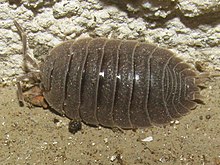Porcellio dilatatus
| Porcellio dilatatus | |
|---|---|

| |
| Scientific classification | |
| Domain: | Eukaryota |
| Kingdom: | Animalia |
| Phylum: | Arthropoda |
| Class: | Malacostraca |
| Superorder: | Peracarida |
| Order: | Isopoda |
| Suborder: | Oniscidea |
| Family: | Porcellionidae |
| Genus: | Porcellio |
| Species: | P. dilatatus
|
| Binomial name | |
| Porcellio dilatatus Brandt, 1833
| |
Porcellio dilatatus (Commonly known as the Giant canyon isopod) is a species of woodlouse in the genus Porcellio belonging to the family Porcellionidae. This species is widespread in Europe,[1] and has also been introduced to North America from Western Europe.[2] They are 15 millimetres (0.59 in) long, are brown coloured and striped.[3] They can be found feeding on alder leaves,[4] but mostly feeds on organic food substrates, such as lettuce (Lactuca sativa) in the wild. It also feeds on inorganic metal salts.[5]
Pests[edit]
The species are considered to be house pests, that can be found in greenhouses, seed boxes, and flower pots.[3]
Subspecies[edit]
Five subspecies are recognised:[6]
- Porcellio dilatatus bonadonai Vandel, 1951
- Porcellio dilatatus dilatatus Brandt, 1833
- Porcellio dilatatus flavus Collinge, 1917
- Porcellio dilatatus petiti Vandel, 1951
- Porcellio dilatatus rufobrunneus Collinge, 1918
References[edit]
- ^ "Porcellio dilatatus Brandt, 1833". Fauna Europaea. 2.6.2. August 29, 2013. Archived from the original on October 14, 2013. Retrieved October 12, 2013.
- ^ Poore, G.C.B. (2002). Zoological Catalogue of Australia (PDF). CSIRO Publishing. p. 308. ISBN 978-0-643-06901-5.
- ^ a b David V. Alford (2012). "4" (PDF). Pests of Ornamental Trees, Shrubs and Flowers - A Colour Handbook (2nd ed.). Manson Publishing. p. 435. ISBN 978-1-84076-162-7.
- ^ Isabel Caseiro; S. Santos; J. P. Sousa; A. J. A. Nogueira & A. M. V. M. Soares (2000). "Optimization of culture conditions of Porcellio dilatatus (Crustacea: Isopoda) for laboratory test development" (PDF). Ecotoxicology and Environmental Safety. 47 (3): 285–291. doi:10.1006/eesa.2000.1982. hdl:10198/849. PMID 11139182.
- ^ Carla Filipa Calhôa; Amadeu M. V. M. Soares & Reinier M. Mann (2006). "Cadmium assimilation in the terrestrial isopod, Porcellio dilatatus – is trophic transfer important?". Science of the Total Environment. 371 (1–3): 206–213. doi:10.1016/j.scitotenv.2006.09.013. hdl:10453/8798. PMID 17055036.
- ^ Marilyn Schotte (2012). Schotte M, Boyko CB, Bruce NL, Poore GC, Taiti S, Wilson GD (eds.). "Porcellio dilatatus Brandt, 1833". World Marine, Freshwater and Terrestrial Isopod Crustaceans database. World Register of Marine Species. Retrieved November 23, 2012.
